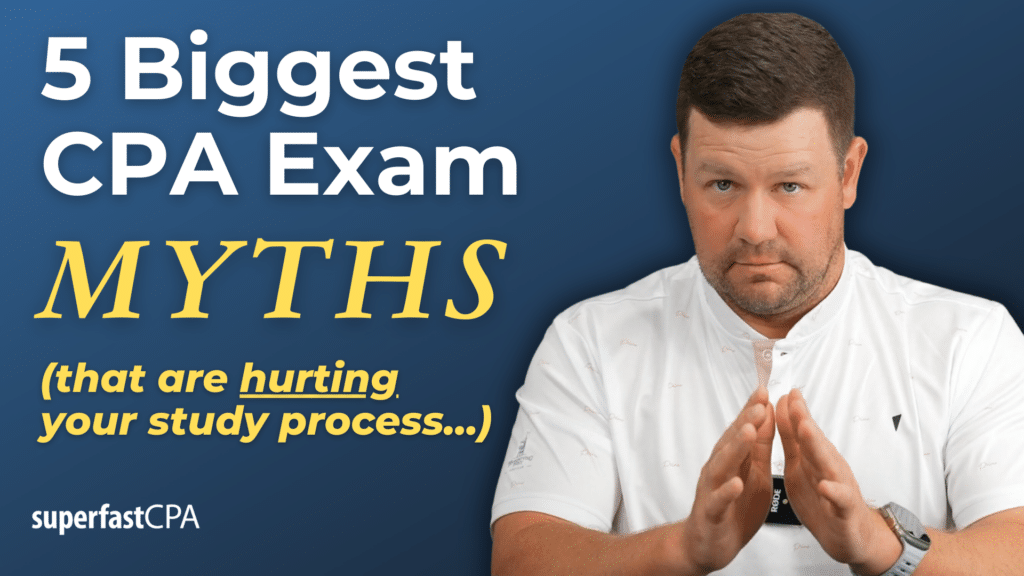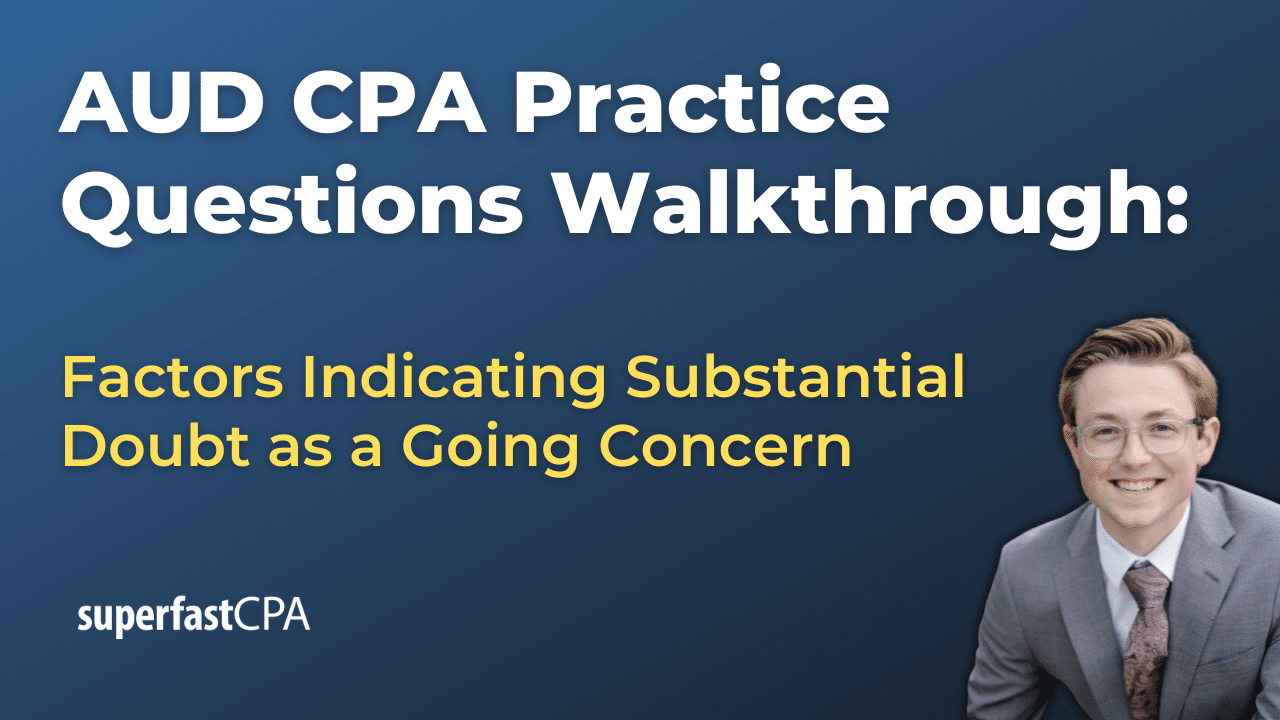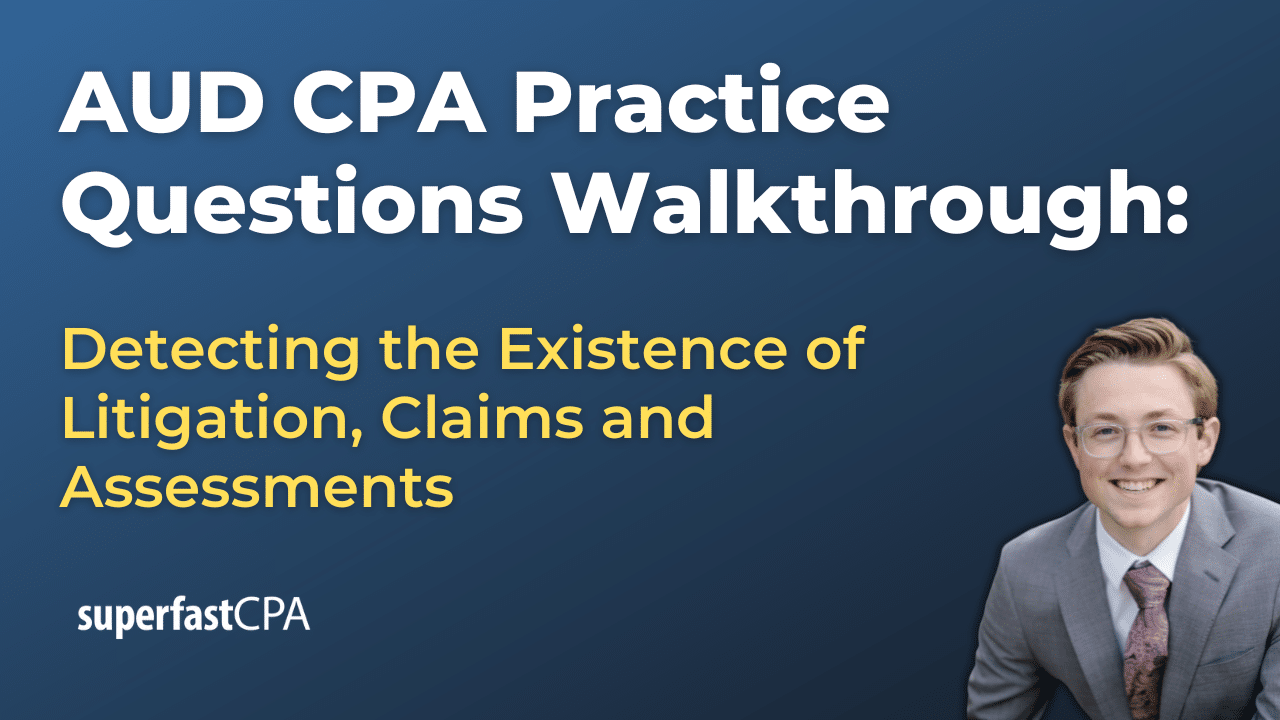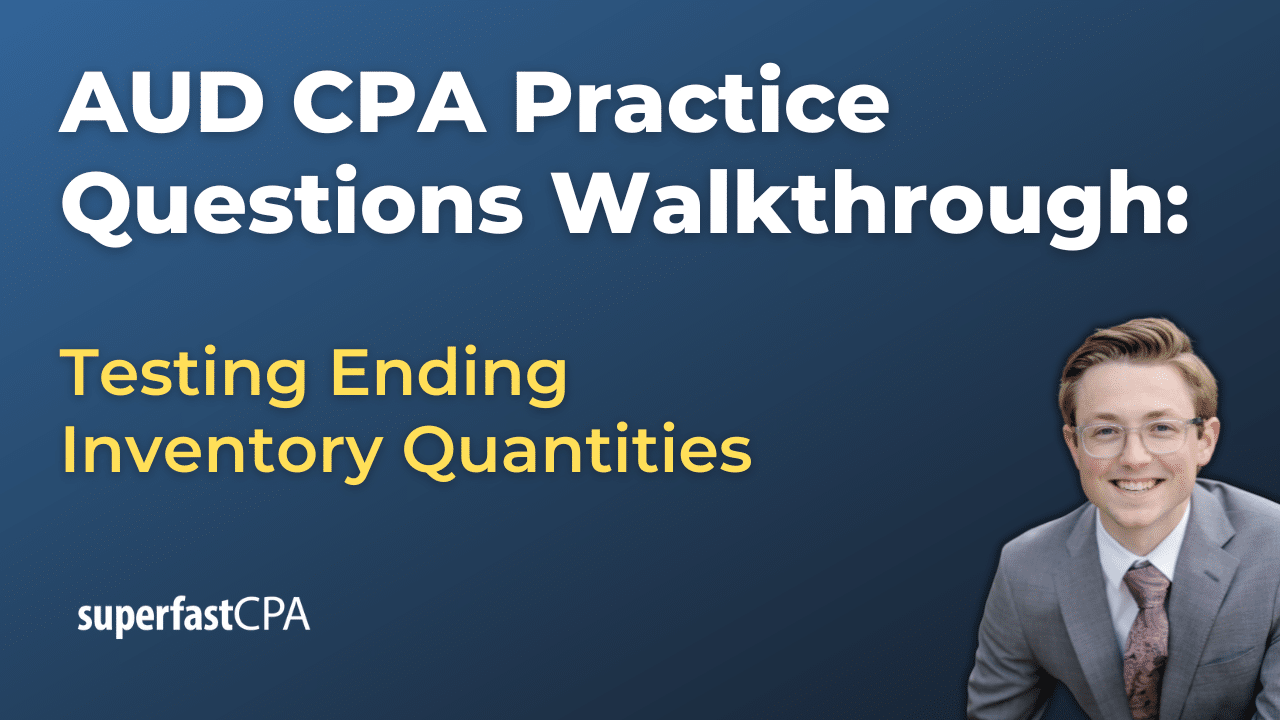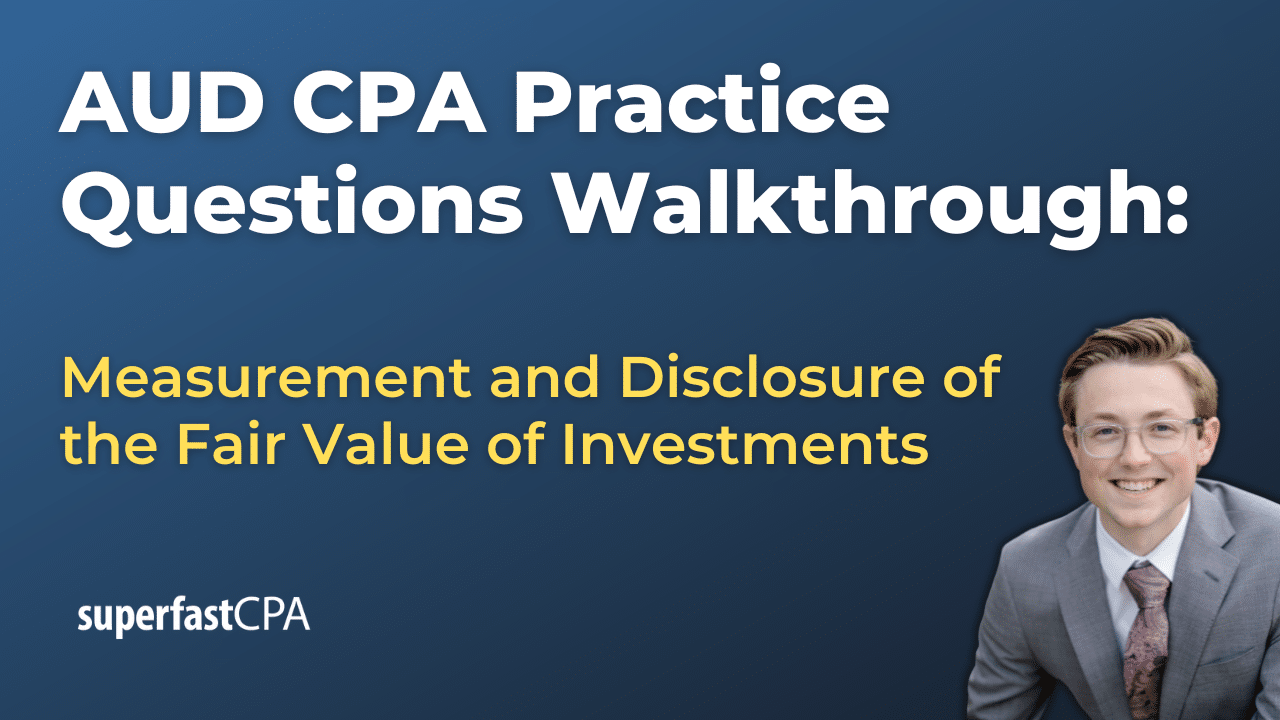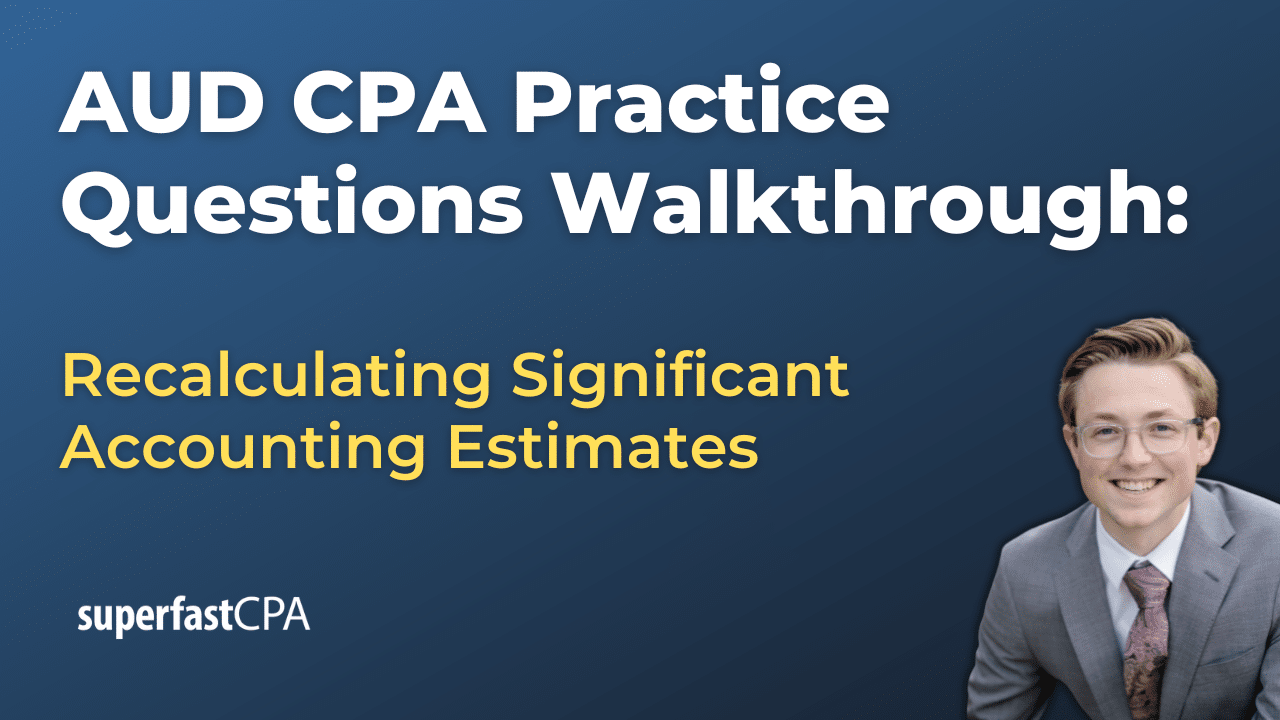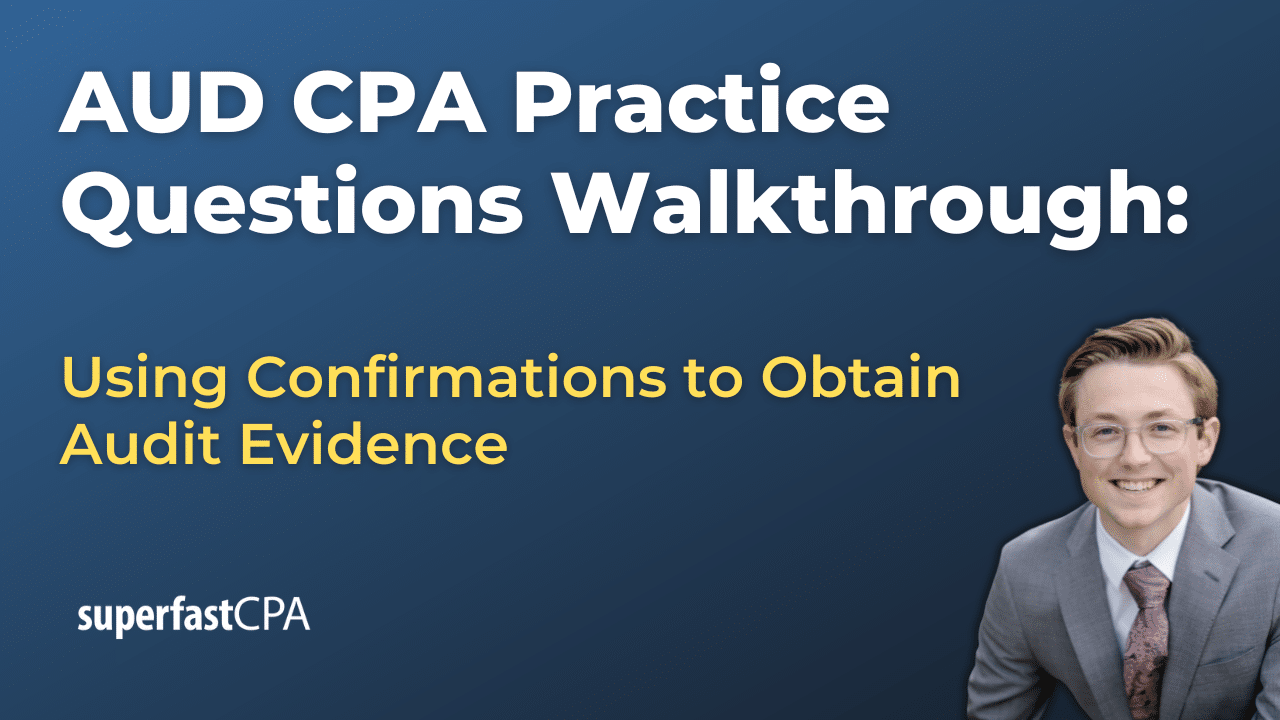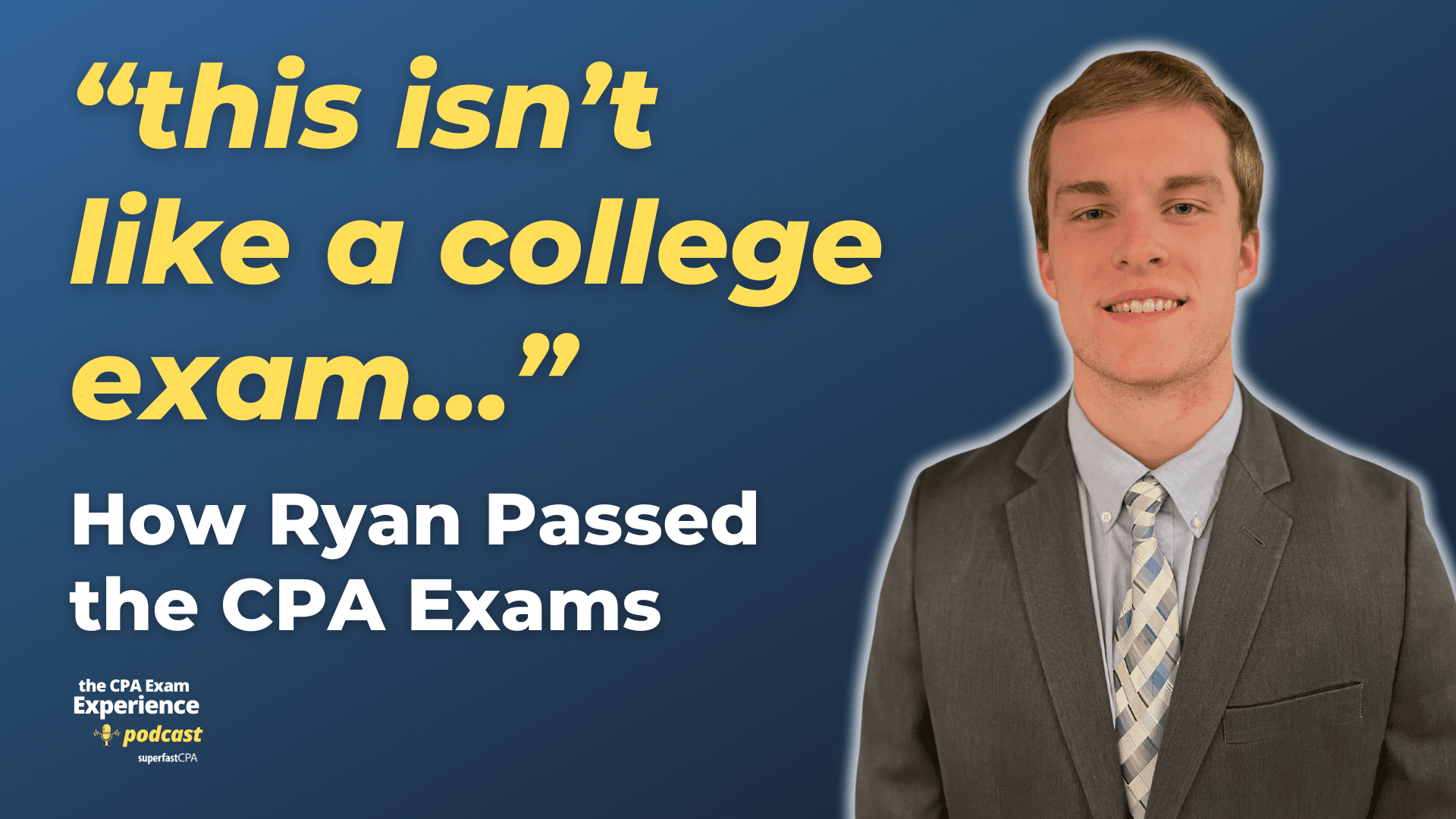In this SuperfastCPA episode, we cover the 5 biggest myths about CPA exam study, and then the reality behind each myth. Understanding these CPA exam myths and what to do differently will help improve your CPA exam study process.
IMPORTANT LINKS:
Master your study process by attending one of our free study training workshops:
https://www.superfastcpa.com/study-secrets/
Episode Timestamps
Episode Transcript
[00:00:00] Nate: and I kind of stopped her as she was explaining all this and I said, okay, you’re making this way too complicated.
Nate: Welcome to another episode of the CPA Exam Experience Podcast and/or YouTube channel from SuperfastCPA. I’m Nate and in today’s episode we’re going to cover the five biggest myths about the CPA exams. We’ll go over each of these five myths and then I will give you the objective truth or the reality behind the myth, in my opinion, of course, so let’s go straight into myth number one.
Myth #1
Nate: So myth number one, and this drives me crazy because I hear it so much, is that time spent is the main thing that matters when it comes to your study process or studying for the CPA exams.
So it’s pretty common to hear that you’ll need to study around four to 500 hours in total to pass the CPA exams. And then along with that, one of the most [00:01:00] common emails I get, or one of the most common questions I get is “how many hours do I need to study for REG?” or “how many hours do I need to study for FAR?”.
And then besides focusing on some arbitrary number of hours that it’s going to take someone to pass the CPA exams, there’s also just the idea, you know, of studying harder or the trite advice, you know, to spend more time, study harder, study more. Now that is obviously true to a point. It’s going to take a lot of study time, it’s going to take a lot of hard work to pass these exams. But when you start saying it’s going to just take you X number of hours, that could not be more incorrect. One hour, you know, one given random hour of studying, depending on the person, it all comes down to their effectiveness. How effective is every hour that you spend studying?
For example, let’s take Hypothetical CPA Candidate A [00:02:00] and Hypothetical CPA Candidate B. CPA Candidate A, let’s just take one random hour out of their study process. So they press play on the video lecture, they’re actually watching it, they think they’re paying attention. Now they might zone out a couple of times and then have to rewatch key parts. But after an hour, they feel like they understood this video lecture. Now, the other thing is this video lecture was only 20 minutes long, but of course, after zoning out a few times, having to restart it, watch key parts over, you know, this 20 minutes took an hour.
And then they go to the practice questions for that topic, and they quickly find out that, that hour they invested to feel like they understood the video lecture didn’t actually help them be able to answer the practice questions. So, in a sense, that hour was somewhat of a waste in terms of what’s actually going to help you on exam day.
Because, of course, on [00:03:00] exam day, you’ve got to be able to answer the questions and the simulations you’re going to see on the exam.
So then we go to hypothetical CPA candidate B, and directly, instead of watching the video lecture, they go straight into the practice questions. And we’ll assume some things like they have a process for strategically breaking down practice questions, making sense of the solutions. But again, after an hour, they’ve covered, let’s say 20 multiple choice questions on the same topic that Candidate A watched the video on, and at the end of an hour, they have a really good sense of these are the types of questions I’m seeing for this topic, these are the four to five main things that these questions keep asking about, and they’ve made sense of them, maybe they’ve made a few flashcards or notes on those key things.
And so with those two hours, so one hour for Candidate A, one hour for Candidate B, it’s very clear that in terms of what actually matters on test day, [00:04:00] Candidate B, one hour extrapolated over a hundred hours studying for that section, is going to be much, much more effective, than Candidate A that just keeps doing this over and over for each lesson, they watch each video lecture, and it’s going to take them, either a much longer time span to get to the same understanding as Candidate B.
So instead of a hundred hours here on Candidate B, strategically breaking down MCQs and simulations, for Candidate A to get to that same level of understanding, it’s going to take four to five times as much time than what candidate B is doing.
So the results that you’re able to extract out of every hour that you spend studying, it can be wildly different, you know, from extremely ineffective, even if you have somebody that’s dedicated, they sit down each day at the same time, in the same place, they have good habits about when they [00:05:00] study and the time they’re putting in, but it’s going to take them till exam day or really score release to find out that all that time they were spending wasn’t that effective.
So to sum it up, it’s very possible to study a hundred, 200, 300 hours for one section, and you can still fail the exam.
Whereas someone who knows how to study strategically, and they’re strategic about every aspect of their study process, they can study altogether for a fraction of the time as someone that is studying ineffectively, and go in and pass, and a lot of times pass with a really high score. There can just be wildly different results from the same amount of study hours.
So the amount of hours and trying to put a specific amount on how many hours it’s going to take any random CPA candidate to pass the exams, that’s a very arbitrary, inaccurate type of thing to say or to shoot for or to try to put a [00:06:00] certain number on.
It is strictly about how effective is every hour that you spend studying, and your overall process and how do things tie together. There needs to be an effective process for moving through new material. There also needs to be a very effective process for reinforcement or re-review, which supports your retention, you know, it’s one thing even if your initial process of moving through each lesson is effective, but if you are forgetting all of that eight weeks later by the time you go into the exam, then all you did was waste a ton of your own time.
So if you would like a very specific breakdown of the key pillars that need to be part of your process and how to do them the most effective way possible and how they all fit together, that is exactly what we cover in our free study training webinars. So the link for that will be down in the description of this video or the podcast episode.
Myth #2
Nate: All right, moving on to myth number two, and [00:07:00] that is that these CPA exams are somewhat of an IQ test. Now, of course, your, your raw intelligence matters a little bit, but the idea that I’m getting at here, this is something that I’ve had over the years, hundredst of emails about, people will send me an email and they’ll say something like, “Okay, I don’t know what my deal is with these exams, but I was the type of person that could, you know, show up to class in college, I did my homework, but I never had to work that hard, and I got good grades. And these exams are making me question my sanity. I can’t pass these, I’ve failed, you know, audit or FAR, I mean, whatever. I’ve failed this exam six times, I’m at my wits end, I have no idea how to approach this, everything I’m trying that worked for me in college is not working at all.
And then me personally, and [00:08:00] again, maybe you’ve experienced this, from my master’s program, I specifically remember, you know, and then X amount of us got hired at the same firm and, uh, a few of the clearly the smartest people from the master’s degree, you know, they’d had internships, they were answering all the professors questions. It was like they, they knew advanced accounting inside and out. I mean, whatever the class was.
But then again, the CPA exams were like a buzzsaw, it’s like they ran into a buzzsaw. They struggled, they failed multiple times, they quit talking about it at work, they wouldn’t participate in the, the water cooler discussion about, you know, where are you at? Did you pass this exam? What are you studying for? They would just avoid the topic because they were embarrassed because they couldn’t pass these exams.
And again, I want to point out these people that I’m thinking of, like specifically, that I’m remembering, they were objectively smarter than me. [00:09:00] I know for a fact, they were smarter than I was, but I passed the exams way sooner than they did. And, this goes back to point number one. This whole thing is strictly about the effectiveness of your study process.
And there’s right ways to do it, and there are wrong ways to do it, absolutely.
So all the details of what that means, how to study, or what the right ways to study are, that’s not the point of this video. Again, I would refer you back to our free study training webinars. That is the best hour you can spend. If you feel like, all this stuff I’m describing is describing you. If you feel lost in the study process or you just want to be absolutely sure that you have the key pieces in place, specifically on the webinar, we cover the five pillars that every successful study process will have.
So again, the link to that will be down in the description.
Myth #3
Nate: Moving on to myth number three, and that is that you need to essentially memorize everything that’s covered in every video [00:10:00] lecture and every chapter of the textbook.
So when I mentioned those really smart, really intelligent people that had a very, very hard time passing the CPA exams, this is exactly their issue. The whole perfection thing, the whole idea of, okay, I need to watch the video, I need to understand and essentially memorize everything covered in the video for this topic, now let me do the same thing with the textbook, now I can look at the practice questions.
So there are two problems with that approach. First is that that takes an inordinate amount of time. That just takes a huge amount of time to really try and understand/memorize every single detail in the video lecture for each topic and the text.
And then the second issue with that is that it naturally means that that person is spending the majority of their study time on what I call textbook context. So textbook context just means where [00:11:00] everything’s laid out, you know, point by point, you get all the background information, and then there is test day context or exam context, which of course just means the context of the MCQs and the simulations. Now those two things, the way that that information is presented, is very, very different, and there’s only one of those that matter. And that of course is exam day context.
The other way that I like to make this point is that a lot of people approach this as if they are trying to earn a PhD. That they’re going to have to give some big dissertation at the end and turn in their 400 page research paper.
And of course that would require a huge amount of time and it would require that you intimately understand and have memorized every single detail about every single accounting concept or standard or rule, tax law, you know, whatever.
But again, the only thing that matters for our purposes, the CPA exams, [00:12:00] is that you can walk in and answer the MCQs and the simulations you’re going to see. So the approach to that is very, very different, or at least to do it as efficiently as possible. It’s very, very different than thinking that you’re trying to like earn your PhD through this process.
And I know that people don’t really think they’re trying to get a PhD through the CPA exams. I’m just saying, that’s how they approach their study process.
In fact, one story I have about this is a few years ago, I got an email out of the blue. This lady said that she runs a hedge fund and to seem more legitimate, she had been trying to pass her CPA exams and she’d been trying for the last two years.
So she was asking me, can we get on a zoom call so you can tell me what I’m doing wrong, you know?
So I told her, okay, it’ll be this much for an hour call, if you want. She sends the payment [00:13:00] right away, so we get on a zoom call and she’s like, okay, let me show you what I’ve been doing. And she had this stack of binders on her desk that I thought was something to do with her work running a hedge fund.
And then she opens them and she starts telling me her whole process, but the amount of time that it must have taken her, and this was for one exam, she had multiple binders. And in fact, she had done this, her same process from the beginning each time. So she had three binders for the same exam section full of notes. And she was honestly almost rewriting the textbook. I mean, to fill up that much paper that she had handwritten, and she had started over completely with each attempt on this exam. I believe it was BEC at the time and I kind of stopped her as she was explaining all this and I said, okay, you’re making this way too complicated.
You’re making this way too complicated. You’re spending all your time [00:14:00] basically exactly what I just explained. She was trying to memorize every single detail by handwriting it, rewriting the textbook, taking notes on every video lecture, doing all this work, pretty much everything besides really strategically breaking down and practicing exam questions and simulations over and over.
So I told her, I essentially covered the basics of what’s covered in our free training webinars that I keep mentioning. And then a few months later, she had passed that section and she passed her other sections, because I just kind of gave her the exact plan to follow, that was way easier, way simpler than what she was trying to do.
And again, I’ll mention this at the end of each one of these myths. If you want to see what those five pillars are and how it is much simpler and much easier, you’re still going to have to put in the time, and it’s a very disciplined approach, not [00:15:00] missing days, nailing the specific parts of the process, but it’s all covered in that free webinar.
Myth #4
Nate: All right moving on to myth number four and that is that you basically need to kiss your friends and family goodbye for 6 to 12 months. That you won’t have a life, can’t do anything socially, you can’t do your favorite things at night like play video games or whatever that is.
Basically the idea that if you’re doing this right that your life has to suck for the entire time until you pass your exams. That is not true at all.
So if you have watched one of our training webinars or you’re a SuperfastCPA user, then you know that our approach to the whole process is, you do a two hour main study session in the morning, and that’s following specific strategies and you’re applying that to your main review course. So whether you have Becker or Roger or Gleim or whatever, you’re going to take our strategies from our PRO course, and you’re going to [00:16:00] apply that to your main review course in these two hour daily study sessions.
So the idea is you do that before work, make the time to do that, you figure that out, that’s a whole separate topic that we have multiple videos on.
But you do two hours in the morning and then throughout your day, meaning your work day, just your whole day, you’re going to use our study tools from our app on your phone in all these three to five minute chunks.
For example, whenever you’re in your car or when you’re doing mundane daily tasks like preparing meals, washing the dishes, you’re just grinding through our audio notes all the time.
And then whenever you’d normally open your phone, which everyone does one to 200 times a day, just look at your screen time report. Even extremely like legitimately busy people still somehow find one to two hours total a day to look at their phone. And that’s evidenced by your screen time report.
So the idea is for a few months to get these [00:17:00] over with and out of your life, you just replace your favorite time wasters, whether that’s Instagram, or ESPN, or checking the news constantly, whatever it is, you replace that with taking quizzes on our app and or reading our review notes. So you’re constantly working through our review notes and audios.
You’re trying to get through those like two to three times a week. You’re taking 10 to 20 of our quizzes a day. And our quiz questions, they’re simplified. The idea is that it’s actually feasible for you to just grind through questions. We use nice, round, simplified numbers. So you’re still learning how the concepts and calculations work, via our quizzes, but you don’t have to try to use your calculator app or pull out scratch paper. It all makes sense, it’s self contained, it’s just feasible to actually do our quizzes on the app, whether you’re in line at the grocery store, or you’re waiting for a zoom call to start, or you’re walking down the hallway to the break room.
There [00:18:00] are a million opportunities each day to actually do these, we call these mini sessions. So the idea is your two hours in the morning, and then these mini sessions, if you’re doing it right and you’re diligent about it, that adds another two to three hours a day of very high quality study time. So by the time you’re done with work each day, so 5, 6, maybe 7 o’clock, you are done studying for the day. You’ve had a very, very successful day of studying, and now you have your evenings free to do the normal stuff, you know, that keeps you sane, recharged, refreshed, you know, whatever. Just the stuff you like doing, you get your evenings back, right now, by just following our process.
And again, the specifics of what that process is, those pillars, is explained in our free training webinar.
Myth #5
Nate: All right, so that leads us to myth number five, and that is that studying from your phone isn’t effective. Now I know that this one, you know, the idea of studying from your [00:19:00] phone isn’t like a common strategy or something that you hear a lot, but a lot of people when they initially hear our process, their reaction is, so half my study time is done from my phone, like how, how effective can that really be?
And the answer is, it’s incredibly effective.
And there’s multiple elements to this as to why it’s effective. First, from a practical standpoint, it just makes it easy for you to fit in a ton of extra study time. So, one of the biggest issues that most CPA candidates have, because most CPA candidates are working full time, usually in public accounting, it’s very demanding.
It’s very hard to find four to five dedicated hours of study time every day.
Just think about it like this, whatever your current study process is, that’s X number of hours per week, over eight weeks or whatever. But if you just add in this one idea, studying from your phone and all the little three to five [00:20:00] minute chunks all throughout your day, you add an extra hour or two even of extra study time, that you didn’t have to find dedicated study time for. Well, that one to two hours a day over eight weeks, that is an extra 100 plus hours. So 100 extra hours that you wouldn’t have otherwise of study time, can only logically improve your retention and understanding, and therefore your score on test day.
So there’s that aspect of it. It makes fitting in more study time much easier. Instead of having to find dedicated study time to study, you can fit it in wherever you’re at, as long as you have your phone. And everyone is absolutely, it’s like our phones are surgically sewn to our hands. Everyone has their phone, we look at them 200 times a day.
Another analogy that will make a lot of sense, is the idea of trying to learn a new language.
Nate: If you’ve ever tried to learn a new language, it’s [00:21:00] incredibly difficult, and everyone understands that you cannot learn a new language from just a few, you know, big study sessions.
The only thing that works to actually become even semi fluent in a new language is to constantly use it. To be constantly using it, basically immersion, right? You have to actually use or try to use, you have to try to constantly force yourself to recall the words, the phrases, the sentences you’ve learned, but you have to actually practically try to use this stuff constantly, to gain a command of a new language.
And so the CPA material is exactly the same way. One big study session done all at once, just once a day, that’s, you know, that’s one thing, but it’s an extra layer of effectiveness to then, okay, 20 minutes ago you were at your desk doing your study session, but now you’re driving to work, you’re [00:22:00] rehashing the stuff that you’ve just studied through audio notes. Then you get to work, you’re walking into your building, you take a few quizzes.
So, it just makes sense that constantly having this stuff run through your brain, multiple, many multiple times a day, is just an extra layer of effectiveness added on to your main study session.
And then my third argument for proving objectively that studying from your phone can be extremely effective, is just the amount of times that you get through the material, so all the topics. So under the traditional study approach where you just have a review course, you go through each lesson tediously, you know, whatever, it takes you eight to 10 weeks to get through all the material, right?
So that’s, you’ve covered each topic once, once. Then you get to your final review. And you, for most people, this turns into a frantic attempt to relearn [00:23:00] everything that they’ve forgotten, but that’s your second time. So under the traditional approach, you’ve covered each topic twice, right?
So compare that to our study approach, and again, I won’t get into all the specifics, this is covered in the free training webinar. But you’re going to dedicate a portion of your main study session each day to a form of re-review, so that you’re constantly re-hitting all the topics you’ve been through on a daily basis.
So then these mini study sessions from your phone with our study tools, this is another form of re-review. So, like I said, you’re trying to get through our notes collectively between the review notes and the audio notes two to three times a week. So that’s all the material, the most tested parts, that’s how our review notes are set up without going on a big diatribe about how we create our notes.
You’re getting through all the material two to three times that way. Our quizzes are fully random by default, so you’re [00:24:00] constantly, it’s kind of like exercise for your brain. Or again, going back to that language example. If you’ve moved to a new country and at night you’re trying to take classes online or in some app or whatever about learning the basics of the language, then out during the day you have people saying things to you, you don’t really understand.
It’s just, you’re constantly trying to assimilate and make sense of this thing you’re trying to learn in a practical sense. That is the same idea behind our quiz questions and the way our quizzes work. You are constantly being quizzed from all topics from the entire section. Anyways, you’re constantly hitting all the topics over and over and over, both in your main session and then through these mini sessions.
So, what makes more sense, to cover each topic a grand total of twice or 30 to 50 times or more with this approach? I think. The answer [00:25:00] is obvious. It’s better, it’s more effective from a comprehension, a deep understanding, having a practical, you know, command of how to answer questions for each topic and your retention, to constantly be re-hitting all the topics all throughout your study process.
So, those are the five big myths, and then the objective truth behind each myth, according to me.
So down in the comments, let me know one big takeaway, or one aha moment you got from anything we covered in those five myths.
And if you found this valuable, please take a second to review the podcast, wherever you listen to these, or like the video and share it with someone, you know, who is working on their CPA exams because these videos, but mostly to be honest, our podcast interviews with our successful customers, those interviews with some of our past customers are collectively, I would say [00:26:00] easily the most helpful free resource available anywhere for people trying to figure out their own study process.
Because over and over through all these stories from multiple angles, and life experience, you get to hear things they struggled with, the way that they figured out those things were not working or how it was a mistake, what they changed, and then what finally worked for them.
So if this is the first video or podcast you’ve seen from us, make sure to subscribe to the podcast and the YouTube channel. There are things we put on the YouTube channel that don’t end up on the podcast, such as walkthrough videos for difficult topics on the different exams.
Anyways, the biggest thing is if you found this valuable, you know, do something to help the algorithm know that, whether it’s a like or a review on the podcast and mostly share it with someone else who you know is also working on their CPA exams.
So thanks for watching or listening and we’ll see you on the next episode. [00:27:00]

